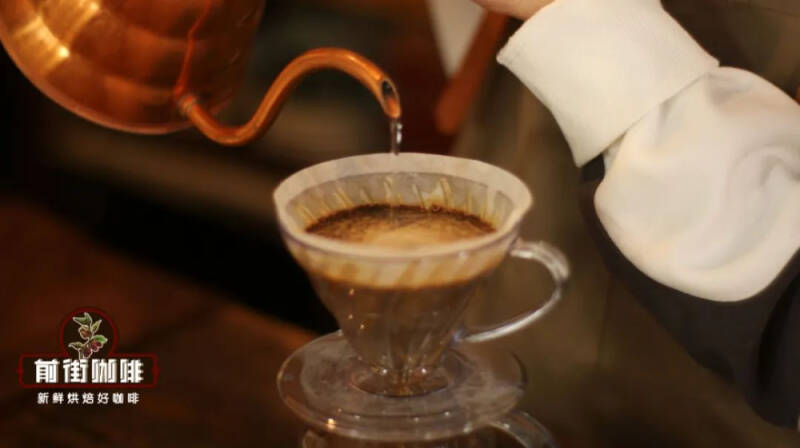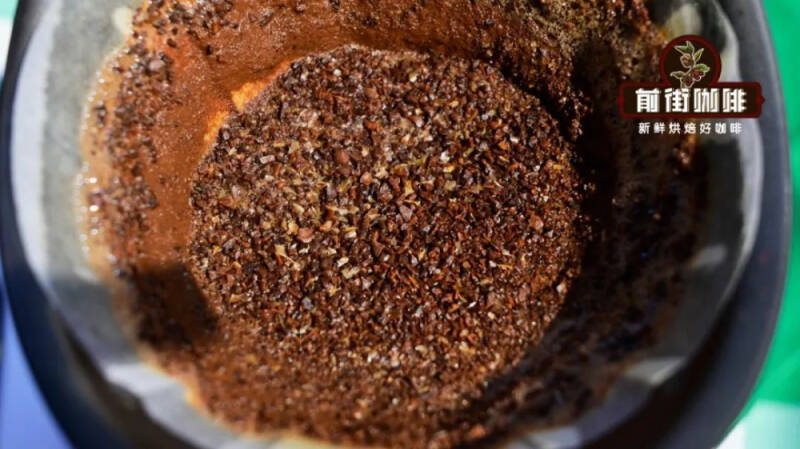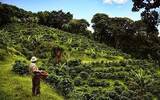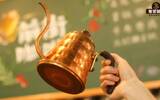Why is the coffee made at home not as good as the coffee in the shop? What details should I pay attention to when cooking by hand?
Most of my friends drink a good bean in the Qianjie store, so they buy the same style directly so that they can enjoy the same delicacy in order to go home. As a result, the coffee brewed at home is completely different from that drunk at the front street store. Then they will ask Qianjie online or offline: "Why can't you brew as good coffee as in the store at home?" beans and brewing methods are the same. "

Beans are the same beans, the cooking method is also the same, but the taste has changed! This shows that there is a deviation in the extraction. Through the feedback of previous guests, Qianjie summed up three factors leading to taste deviation.
First, did not find the right grinding in the process of chat, Qianjie will first ask the guests to ask for a cooked powder pit photo. From the state of the powder pit, we can initially determine where the problem lies. The powder pits often seen through the screen are either muddy or as "rough" as rice grains. In a situation like this, the reason why you can't make good coffee is that you can't find the right grinding.

For beginners, it is difficult to judge whether the degree of grinding is correct or not. after all, most people, including coffee veterans, do not buy calibration tools for coffee powder, and there is no great need! So how do we judge whether a degree of grinding is correct? In fact, it is very simple, like espresso, first find a safe brewing formula! Then judge whether the grinding is correct according to the final cooking time. For example, the formula commonly used in Qianjie is: 15g powder, 1:15 powder-water ratio, V60 filter cup, three-stage type, cooking time about 2 minutes. If your cooking time exceeds the time of this formula for more than 15 seconds, then the grinding deviation is more serious and we need to correct it. If the time is too long, the coffee powder will be thickened, and if it is too short, it will be fine.
It should be noted that beans with different baking degrees and different treatment methods are different in grinding, because the reasons of treatment and baking will lead to their different structure and brittleness, so do not use the same degree of grinding. grind all coffee beans. (this is a mistake that many friends will touch.) of course, this is not necessarily the result of the wrong degree of grinding, but also the result of the quality of the bean grinder: problems such as too much fine powder and insufficient grinding are very common. Therefore, sieving powder, secondary grinding and improving the quality of bean grinder are all optional solutions.
Second, no use for the water temperature if there is no problem with your powder pit and there is no big deviation in the cooking time, then the problem may lie in the water temperature! Just like the degree of grinding, the same water temperature can hardly be applied to all coffee beans. Although the difference of several degrees of hot water can extract the substances from the coffee, but often, the appropriate water temperature can play the role of icing on the cake and increase the fault tolerance rate, in short, it can make it easier for you to make good coffee!
The extraction efficiency is determined by the water temperature. The higher the water temperature, the stronger the extraction efficiency, and vice versa. What we pay attention to in brewing coffee is to extract the substance from the coffee "properly". Not too much, not too little, just right is the best! So a suitable water temperature is very important! If you don't know how to find the right water temperature, you can directly apply the following formula: ↓, the water temperature for shallow roasted coffee beans is 91 ~ 93 °C, and that for medium and deep roasted coffee beans is 86 ~ 88 °C.
Third, the water for cooking is finally the water for cooking, which is a factor that is easy to be overlooked. But compared with the first two, the impact will be less significant. The microelements in water are the main reasons that affect the extraction. Studies have shown that the presence of an appropriate amount of these microelements can help us better extract good coffee! For example, magnesium ions can better extract the sweetness of coffee; calcium ions can better extract the sour taste of coffee, and so on. But only if it's in the right amount!
If there are too many microelements, the water quality will harden! A large number of microelements will fill the space in the water, leaving no room for coffee substances. Therefore, if the water quality used when making coffee is excellent, it will be very difficult for you to fully extract the substances from the coffee, thus affecting the taste. Of course, we don't have to worry too much about water quality. After all, just make coffee at home, do not need to study too deeply, as long as you know that water has an impact on coffee! As for the need to change the water quality, it depends on the specific performance of the coffee taste before making a decision! If there is no problem with a series of parameters such as grinding, time, water temperature and so on, but the coffee still has a negative feeling, then you might as well change the brewing water at this time to see if the coffee flavor can be improved.
With regard to the evaluation of water quality, we can move to "what kind of water is the most suitable for making coffee?" In this article, the influence of water temperature can be shifted to "how much does water temperature affect coffee extraction?" "~ I hope it can help you make delicious coffee ~ ~
-END-
Important Notice :
前街咖啡 FrontStreet Coffee has moved to new addredd:
FrontStreet Coffee Address: 315,Donghua East Road,GuangZhou
Tel:020 38364473
- Prev

Multiple impacts on exchange rate climate and economy! Costa Rica's coffee industry declines
It is understood that Costa Rica's economy is based on coffee production and is famous for its rich coffee tradition and high-quality coffee beans. But today Costa Rica's coffee industry is affected by many problems. Currently, the Costa Rican coffee industry is mainly affected by exchange rate issues, changing government policies, labor shortages and
- Next

In order to drink more refined coffee, she invented the filter cup! Who invented hand-brewed coffee? Who is Ms. Melita?
There are many ways to make coffee, and different methods of making coffee will add different flavors to it. Among these countless production methods, hand-brewed coffee stands out with its special advantages of speed, convenience, cleanliness and good flavor, and has become one of the mainstream coffee production methods that are now popular around the world. hand-washed coffee
Related
- What grade does Jamaica Blue Mountain No. 1 coffee belong to and how to drink it better? What is the highest grade of Blue Mountain coffee for coffee aristocrats?
- What are the flavor characteristics of the world-famous coffee Blue Mountain No. 1 Golden Mantelin? What are the characteristics of deep-roasted bitter coffee?
- Can I make coffee a second time in an Italian hand-brewed mocha pot? Why can't coffee be brewed several times like tea leaves?
- Hand-brewed coffee flows with a knife and a tornado. How to brew it? What is the proportion of grinding water and water temperature divided into?
- What is the difference between Indonesian Sumatra Mantinin coffee and gold Mantinin? How to distinguish between real and fake golden Mantelin coffee?
- What does bypass mean in coffee? Why can hand-brewed coffee and water make it better?
- Unexpected! Ruixing Telunsu lattes use a smoothie machine to foam milk?!
- % Arabia's first store in Henan opens into the village?! Netizen: Thought it was P's
- Does an authentic standard mocha coffee recipe use chocolate sauce or powder? Mocha Latte/Dirty Coffee/Salty Mocha Coffee Recipe Share!
- What is the difference between Vietnam egg coffee and Norway egg coffee? Hand-brewed single product coffee filter paper filter cloth filter flat solution!

